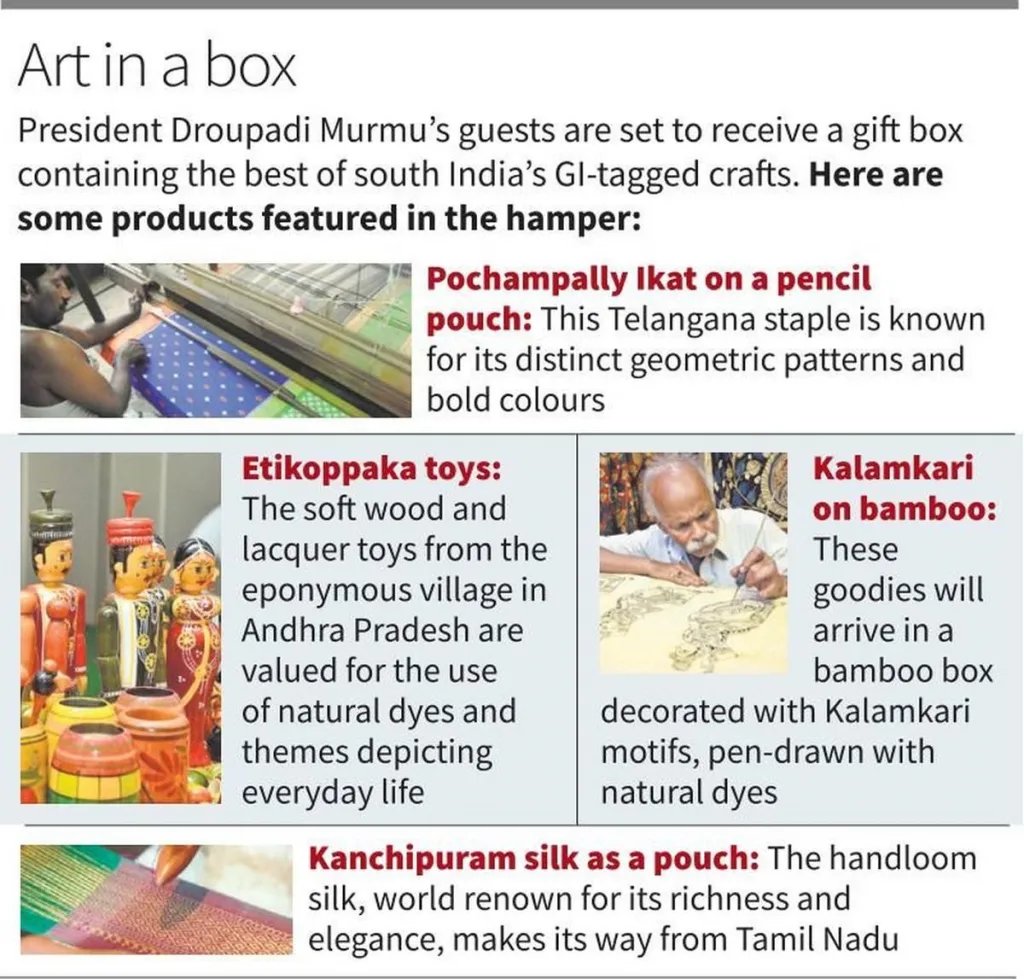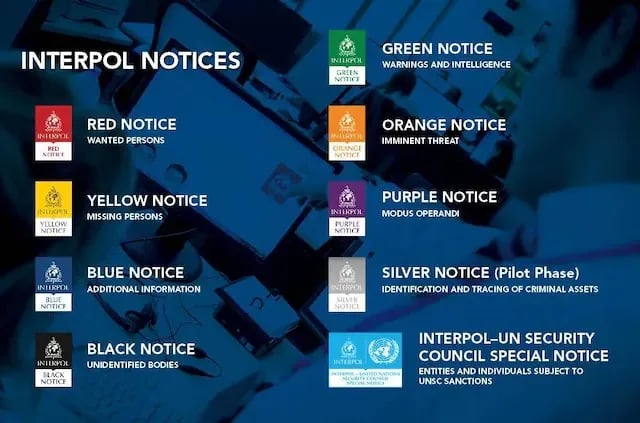President’s Invite for ‘At Home’ to Honour Crafts from South
Syllabus: GS1/ Culture
Context
- The Rashtrapati Bhavan’s revamped “At Home” reception for the 75th Indian Republic Day showcases India’s rich cultural heritage by including a curated box of Geographical Indication (GI)-tagged handcrafted items from five southern states.
About
- The craft products in the invitation box are all made in the southern States, have GI (geographical indicator) tags, and are drawn from the “One District One Product” scheme.
- The elements of the invitation include:
- A box made of bamboo weave with Kalamkari paintings, an ancient art form using natural dyes, on it done by Nimmalakunta artisans.
- An Ikat-Pochampalli cover (Ikat involves a complex dyeing process where yarns are resist-dyed before weaving, resulting in geometric patterns).
- A fridge magnet depicting Mysore’s Ganjifa art, which involves intricate hand-painting with mythological themes, linked with the Dashavatara (ten incarnations of Vishnu).
- A handmade pouch of Kanjeevaram silk from Tamil Nadu.
- Etikopakka dolls from Andhra Pradesh, made using the age-old Turned Wood Lacquerware, along with a bookmark made of screwpine leaves woven by artistes from Kerala.

Source: TH
Interpol Introduces Silver Notice
Syllabus: GS2/ International Organisations
In News
- The International Criminal Police Organisation (Interpol) has launched its first Silver Notice, an initiative aimed at tracing and recovering assets laundered across borders.
- This pilot project involves 52 countries, including India.
What is the Silver Notice?
- About: The Silver Notice is the latest addition to Interpol’s colour-coded alert system, designed to assist member countries in identifying, locating, and recovering criminally obtained assets. These assets can include:
- Properties
- Vehicles
- Financial accounts
- Businesses
- The notice is a crucial tool for addressing criminal activities such as:
- Fraud
- Corruption
- Drug trafficking
- Environmental crimes
- The pilot phase will run until November 2025.
How Does It Work?
- Requesting Information: Member countries can request information about assets suspected of being linked to criminal activities.
- Identification and Action: The notice aids in locating assets, enabling further legal measures such as seizure or confiscation, in accordance with national laws.
- General Secretariat Review: Before issuance, the Interpol General Secretariat reviews each notice to ensure compliance with organisational rules and to prevent misuse for political purposes.
India’s Role and Benefits
- India, as a participant, stands to gain significantly. India has a long-standing issue with fugitive economic offenders and unaccounted black money transferred to tax havens.
- It provides a platform to enhance India’s efforts in combating financial crimes and bringing offenders to justice.
About INTERPOL Notices
- International Information Sharing: INTERPOL Notices are international alerts or requests for cooperation that enable police in its 195 member countries to share vital crime-related information.
- Types: There are eight different types of notices, each serving a specific purpose.

- Issued By: The Interpol General Secretariat.
- Requested By: Member countries’ National Central Bureaus.
- International Criminal Tribunals and the International Criminal Court.
- The United Nations (for implementing Security Council sanctions).
Source: BS
Indian Customs Electronic Gateway (ICEGATE)
Syllabus: GS3/Economy
In News
- The government has formed a committee to establish a reliable system for publishing accurate data, following discrepancies in gold import figures.
- The errors in the data occurred due to a migration of the data transmission mechanism from the Special Economic Zone (SEZ) system to the ICEGATE platform.
ICEGATE (Indian Customs Electronic Commerce/Electronic Data Interchange Gateway)
- It is a unified platform for capturing and processing trade data from ports, airports, and container depots.
- It collects Export-Import (EXIM) data from over 500 locations across India.
- It ensures real-time transmission of trade data to the Directorate General of Commercial Intelligence and Statistics (DGCIS).
- Functions of ICEGATE: Captures trade data from all ports, airports, and SEZs.
- Transmits reconciled and accurate data to DGCIS for precise trade statistics.
- Prevents duplication by integrating trade data from both SEZs and non-SEZs.
Source: PIB
Conductive Ink
Syllabus: GS3/ S&T
In News
- The indigenous know-how of silver nanowire-based conductive ink technology was successfully transferred to two promising Indian startups.
About
- This transfer marks a crucial step in enhancing India’s capabilities in the electronics sector, particularly in the production of conductive inks and adhesives.
- The global market for silver nanowire-based conductive ink and adhesive is projected to exceed $16.87 billion by 2032.
About Conductive Ink
- Conductive ink is a special type of paint that contains silver or carbon particles, allowing it to conduct electricity.
- Unlike traditional circuits made with copper wires, this ink enables circuits to be directly drawn onto various surfaces.
- Key Applications:
- Repairing and enhancing circuits on printed circuit boards (PCBs)
- Flexible electronics such as foldable screens, keyboards, and windshield defrosters
- Used in RFID tags, wearable devices, sensors, displays, and solar panels
- Holds potential for interactive marketing and signage with touch-enabled features.
Source: PIB
Blue Flag Certification
Syllabus: GS3/Environment and Sustainability
Context
- Kerala’s Kappad and Chal beaches in Kozhikode and Kannur districts, have been bestowed with the Blue Flag certification.
Blue Flag Certification
- Given By: Foundation for Environment Education in Denmark (FEE) accords the globally recognized eco-label – Blue Flag certification.
- Stringent Criteria: FEE gives the award to beaches, marinas, and boating operators that meet 33 criteria.
- Broadly, they are divided into four categories, covering water quality, environmental management, safety, and environmental information and education.
- The standards were established by the Copenhagen-based Foundation for Environmental Education (FEE) in 1985.
- The certification is updated annually, and locations must continue to meet the criteria to retain their Blue Flag status.
- Blue Flag Beaches:
- There are over 4000 Blue Flag certified beaches across the world, with Spain leading with a total of 729 blue flag sites, followed by Greece.
- India has 13 such beaches, the Chandrabhaga beach on the Konark coast of Odisha is the first in Asia to get the Blue Flag certification.
- Significance:
- promote sustainable tourism,
- protect ecosystems,
- and encourage environmental stewardship at recreational sites.
- It helps tourists identify destinations that prioritize environmental and safety standards.
Source: TH
Animal Welfare Board of India (AWBI)
Syllabus :GS 3/Environment
In News
- The Animal Welfare Board of India (AWBI) and NALSAR University of Law, Hyderabad, have signed a memorandum of understanding to train animal welfare volunteers in animal care laws and procedures.
Animal Welfare Board of India (AWBI)
- It was established in 1962 under the Prevention of Cruelty to Animals Act, 1960.
- It was founded under the leadership of humanitarian Rukmini Devi Arundale.
- Composition: The Board consists of 28 members, including 6 Members of Parliament (2 from Rajya Sabha and 4 from Lok Sabha).
- Term of Office: The term of office for members is 3 years.
- Functions: It ensures the enforcement of animal welfare laws.
- It provides grants to Animal Welfare Organizations.
- It advises the Government of India on animal welfare issues.
Source :TH
Previous article
Pesticide Poisoning and Regulations